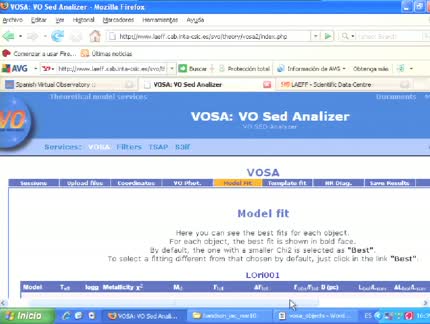Found 9 talks width keyword Virtual Observatory

Abstract
I've heard many times about the Virtual Observatory, but what really is VO? Is it just for IT people?, for data centres?, for astronomers?, for everybody? Who is behind VO? Is the Virtual Observatory sustainable in the medium-term? Was it just a nice idea or is it really having an impact on the way astronomers make science with archive data?
In this talk I'll try to answer all these questions by describing the Spanish Virtual Observatory, an initiative that began in 2004 with the aim of coordinating at national level the VO-related activities in four different fields.
Special focus will be given to usage examples of VO tools for real VO-science projects.

Abstract
For over 20 years, the Southeastern Association for Research in Astronomy (SARA) has operated a remotely-accessible 1-m-class telescope at the Kitt Peak National Observatory near Tucson, Arizona that has served as a focus for faculty and student research. From its four charter institutional members, the SARA consortium has grown to include a dozen universities spanning Indiana to Florida. In 2007, SARA assumed operations of a similar remotely-operated telescope at Cerro Tololo Interamerican Observatory in Chile. SARA has most recently partnered with the Instituto de Astrofisica de Canarias (IAC) to automate and assume operations of the Jacobus Kapteyn Telescope (JKT) at the Roque des los Muchachos on La Palma. This talk will provide a brief historical perspective on the SARA consortium as well as a summary of our facilities, research interests and prospects for the future.

Abstract
The Virtual Observatory (VO) is an international astronomical community-based initiative. It aims at providing easy and efficient access and analysis of the information available at astronomical archives and services. The Spanish Virtual Observatory (SVO, http://svo.cab.inta-csic.es) is part of this initiative since 2004, coordinating the VO activities at national level. ARCHES (Astronomical Resource Cross-matching for High Energy Studies, http://www.arches-fp7.eu) is a FP7 project whose goal is to provide scientifically validated spectral energy distributions and cross-correlated catalogues of the sources included in the 3XMM (DR4) catalogue. These enhanced resources will definitively ease the exploration of a wide range of astrophysical questions by the time they become public (beginning 2016).
In this presentation, after an overall view of the current status of the Virtual Observatory and some of the most relevant VO-science projects carried out in the SVO framework, I will focus on the VO-science case I am responsible for within ARCHES: A multiwavelength study of circumstellar discs around late-type main sequence stars.

Abstract
El curso tendrá un carácter eminentemente práctico. Tras una breve serie de presentaciones sobre el proyecto Observatorio Virtual y las herramientas de análisis existentes se procederá al desarrollo de casos científicos reales utilizando una metodología VO. El desarrollo de estos casos científicos se realizará bajo la supervisión de personal del Observatorio Virtual Español.

Abstract
El curso tendrá un carácter eminentemente práctico. Tras una breve serie de presentaciones sobre el proyecto Observatorio Virtual y las herramientas de análisis existentes se procederá al desarrollo de casos científicos reales utilizando una metodología VO. El desarrollo de estos casos científicos se realizará bajo la supervisión de personal del Observatorio Virtual Español.

Abstract
El curso tendrá un carácter eminentemente práctico. Tras una breve serie de presentaciones sobre el proyecto Observatorio Virtual y las herramientas de análisis existentes se procederá al desarrollo de casos científicos reales utilizando una metodología VO. El desarrollo de estos casos científicos se realizará bajo la supervisión de personal del Observatorio Virtual Español.

Abstract
El curso tendrá un carácter eminentemente práctico. Tras una breve serie de presentaciones sobre el proyecto Observatorio Virtual y las herramientas de análisis existentes se procederá al desarrollo de casos científicos reales utilizando una metodología VO. El desarrollo de estos casos científicos se realizará bajo la supervisión de personal del Observatorio Virtual Español.

Abstract
El curso tendrá un carácter eminentemente práctico. Tras una breve serie de presentaciones sobre el proyecto Observatorio Virtual y las herramientas de análisis existentes se procederá al desarrollo de casos científicos reales utilizando una metodología VO. El desarrollo de estos casos científicos se realizará bajo la supervisión de personal del Observatorio Virtual Español.

Abstract
The Virtual Observatory is an international initiative on standardizing astronomical data and protocols, as well as the development of scientific tools. Nowadays, the Virtual Observatory (VO) offers a number of powerful tools to manipulate and analyze catalogs, images, spectra and, of course, to inter-operate with the Virtual Observatory archives. In the SIE, we resume our SIEminar series, short and technical seminars, like this one in which Jorge will present the most interesting tools the Virtual Observatory offers.« Newer Older »
Próximas charlas
- HOY: High-accuracy spectral modeling and chemical abundances for the oldest starsDr. Junbo ZhangThursday December 11, 2025 - 10:30 GMT (Aula)









